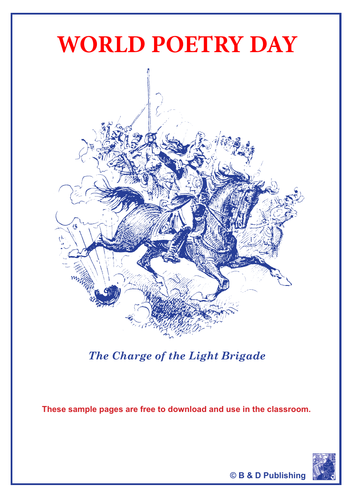

A free World Poetry Day lesson resource from B and D Publishing. World Poetry Day is celebrated every year on 21 March. This resource covers work on acrostics and the following poems, with questions and commentary:
The Charge of the Light Brigade by Alfred, Lord Tennyson
The Tiger by William Blake
The Listeners by Walter de la Mare
Leisure by William Henry Davies
Some of the work in this pack is adapted from B and D Publishing’s full schemes of work, Forty Favourite Poems Series One and Two. The Forty Favourite Poems series consists of two resource packs, each containing forty poems that are essential reading for all lovers of English literature. Series One is suitable for use with students at KS3 and Series Two for students working at KS4 and beyond. The copyright free text plus work on each poem is provided.
Forty Favourite Poems Series One (KS3)
https://www.tes.com/teaching-resource/ks3-forty-favourite-poems-series-one-scheme-of-work-11904418
Forty Favourite Poems Series Two (KS4)
https://www.tes.com/teaching-resource/ks4-forty-favourite-poems-series-two-scheme-of-work-11902267
Forty Favourite Poems Series One includes: The Charge of the Light Brigade, Sea Fever, The Eagle, Silver, Inversnaid, Home Thoughts from Abroad, Snake, Cargoes, Sarah Byng and many more.
Forty Favourite Poems Series Two includes: To a Mouse, A Case of Murder, Toads, Dover Beach, Stop All The Clocks, Ode to Autumn, The Thought Fox, If, Ozymandias, Leisure, Binsey Poplars and many more.
See also our Language for Literature resource packs. Pupils need to talk and write about many aspects of the texts they use. To do this well they need to be familiar with the major technical terms. B & D Publishing’s two Language for Literature schemes of work spanning key stages 3 and 4 give pupils a sound understanding of many literary terms.
The literary terms covered include Acrostics, Alliteration, Anecdote, Clerihew, Epic, Imagery, Simile, Metaphor, Myth, The Ballad, Fable, Assonance, Autobiography, Cinquain, Cliché, Elegy, Haiku, Ambiguity, Rhyme, Rhythm, Kenning, Legend, Ode, Parable, Parody, Personification, Sonnet, Limerick, Soliloquy, Pun, Spoonerisms, Dialect, Dialogue, Epitaph, Onomatopoeia, Proof Reading, Proverbs, Riddles, Anachronism, Allegory, Diaries and Journals, Dramatic Irony, Hyperbole and much more.
Language for Literature Series One (KS3)
https://www.tes.com/teaching-resource/language-for-literature-series-one-scheme-of-work-11911638
Language for Literature Series Two (KS4)
https://www.tes.com/teaching-resource/language-for-literature-series-two-scheme-of-work-11911644
For even better value a KS3 and KS4 Language for Literature & Forty Favourite Poems Bundle is also available: https://www.tes.com/teaching-resource/language-for-literature-and-poetry-bundle-ks3-and-ks4-11930332
Visit our Shop for more high quality English resources: https://www.tes.com/teaching-resources/shop/BandDPublishing
Something went wrong, please try again later.
This resource hasn't been reviewed yet
To ensure quality for our reviews, only customers who have downloaded this resource can review it
Report this resourceto let us know if it violates our terms and conditions.
Our customer service team will review your report and will be in touch.